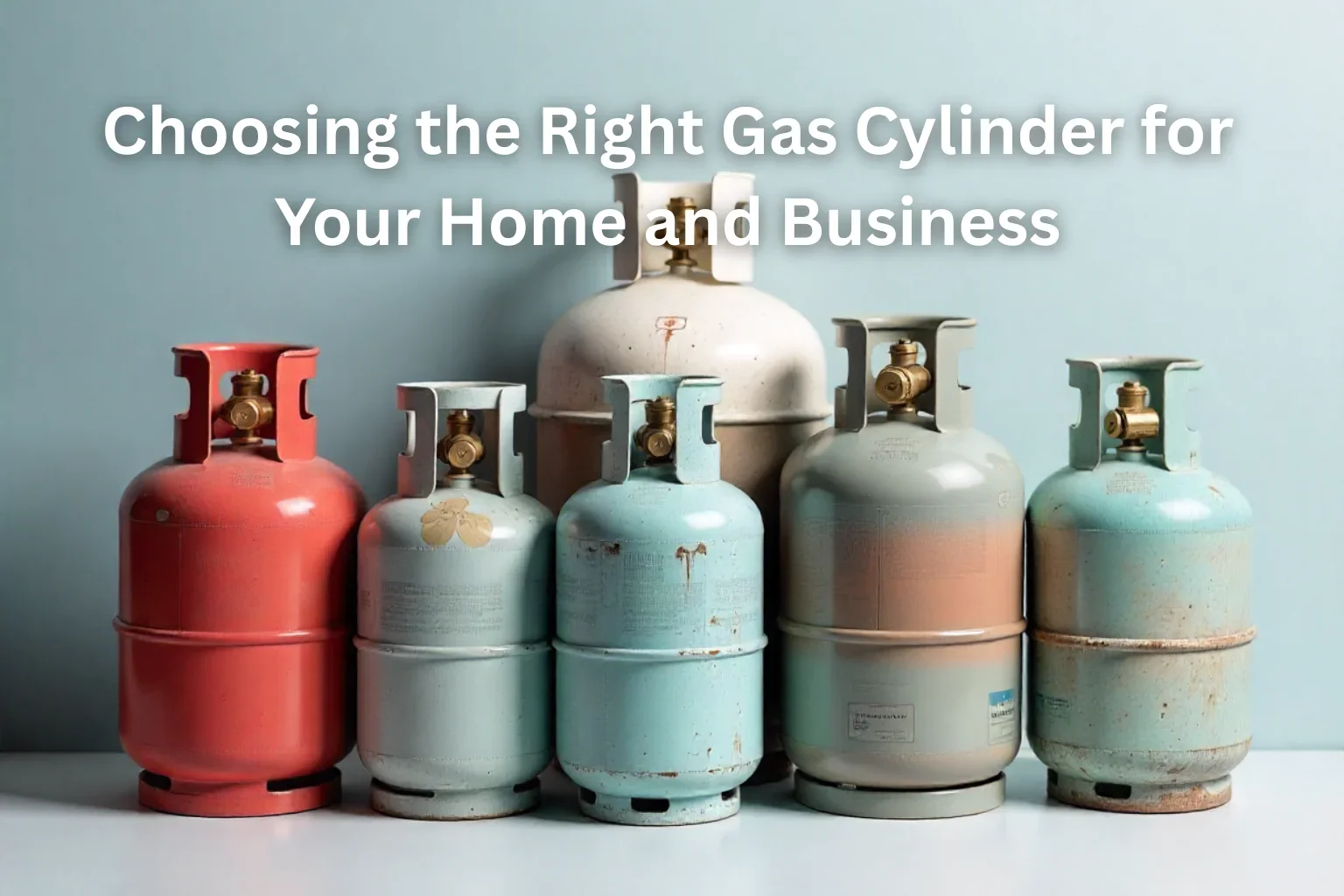Choosing the Right Gas Cylinder for Your Home and Business
When it comes to choosing the right gas cylinder for your home or business, the decision can be daunting due to the numerous options available in the market. Whether you need a gas cylinder for cooking, heating, or industrial purposes, it is crucial to understand the different types, sizes, and safety precautions to ensure you select the best one for your needs.
Understanding Gas Cylinders
A gas cylinder is a container used for storing and transporting various types of gases, including propane, butane, oxygen, and carbon dioxide. They come in different sizes and pressure ratings, making it essential to choose one that suits your specific requirements. Gas cylinders are commonly used for a variety of applications, from household cooking to industrial operations, and understanding their features is key to selecting the right one.
Factors to Consider When Choosing a Gas Cylinder
There are several factors to consider when selecting a gas cylinder for your home or business:
1. Purpose of Use
The first step in choosing the right gas cylinder is determining its intended use. Gas cylinders serve different purposes, such as cooking, heating, welding, or powering industrial machinery. The type of gas inside the cylinder—such as propane, butane, or industrial gases—will depend on your usage.
Home use: For residential purposes, smaller gas cylinders such as propane or butane cylinders are often used for cooking and heating.
Business use: For businesses, larger gas cylinders are typically required for industrial applications such as manufacturing, welding, or heating.
2. Gas Type
Different types of gases are stored in gas cylinders depending on the intended application. Here are some common types:
Propane: Often used in home heating and cooking. It is also a popular choice for portable heaters.
Butane: Frequently used for indoor applications such as portable stoves and in the camping industry.
Oxygen: Used in medical and industrial fields.
Carbon Dioxide: Common in the beverage industry for carbonating drinks.
Knowing which type of gas you need will help you choose the correct cylinder.
3. Size and Capacity
Gas cylinders come in various sizes, ranging from small, portable cylinders to large industrial tanks. The size of the gas cylinder you need will depend on the volume of gas required for your activities. Consider the following:
Small cylinders: These are usually for home use, such as those used in BBQ grills or small camping stoves.
Medium cylinders: Suitable for moderate residential or commercial purposes, such as home heating or cooking in small restaurants.
Large cylinders: Typically used for industrial and business purposes where high gas consumption is needed.
Always ensure that the cylinder you choose has enough gas capacity to meet your needs without running out too quickly.
4. Pressure Rating
Each gas cylinder has a pressure rating, which indicates the amount of pressure the cylinder can safely handle. The higher the pressure rating, the more gas the cylinder can hold. Ensure that the cylinder you choose matches the pressure specifications required for your equipment or appliances.
5. Safety Features
Safety is paramount when choosing a gas cylinder. Look for cylinders that come with the following safety features:
Pressure Relief Valve: This ensures that gas pressure within the cylinder does not exceed the safety limits.
Valve and Regulator Compatibility: Ensure that the cylinder’s valve is compatible with your equipment’s regulator.
Inspection and Certification: Always choose a cylinder that has been inspected and certified for safety.
6. Cylinder Material
Gas cylinders are typically made from steel or aluminum. Each material has its advantages:
Steel Cylinders: More durable and resistant to damage but are heavier.
Aluminum Cylinders: Lighter and more corrosion-resistant but can be more expensive.
Choose the material based on your needs for portability and durability.
The Importance of Gas Cylinder Inspections and Maintenance
Once you’ve chosen the right gas cylinder, regular maintenance and inspections are essential to ensure its safe and efficient operation. Over time, gas cylinders can experience wear and tear, including damage to valves or corrosion. Inspections should be conducted regularly to identify any issues early.
Check for leaks: Always check for leaks by applying soapy water to the valve area. Bubbles will appear if there is a leak.
Replace outdated cylinders: Gas cylinders have a lifespan. Ensure that you replace them before they expire to maintain safety.
Proper storage: Always store gas cylinders in a cool, dry place, away from direct sunlight and heat sources.
Gas Cylinder Refills and Exchange Services
For ongoing use, you will need to refill or exchange your gas cylinder when it runs out. Many suppliers offer refill or exchange services, where you can either refill your empty cylinder or exchange it for a full one.
Refill: Refill services allow you to get your cylinder topped up without replacing the entire tank.
Exchange: Exchange programs offer a new, pre-filled cylinder in exchange for your empty one. This is usually a quicker and more convenient option.
FAQs
1. What is the most common gas used in home cooking cylinders?
The most common gases used in home cooking gas cylinders are propane and butane. Propane is more commonly used for outdoor cooking, such as BBQ grills, while butane is used for indoor stoves.
2. How do I know if a gas cylinder is safe to use?
Ensure that your gas cylinder is certified and has passed safety inspections. Check for any visible damage, corrosion, or leaks before use. Always store and handle your cylinder according to manufacturer guidelines.
3. Can I use any gas cylinder for my business?
No, it’s essential to choose a gas cylinder that is suitable for your business’s specific needs. Consider the type of gas, size, pressure, and safety features required for your operations. Always consult with a professional before making a purchase.
4. How long does a gas cylinder last?
The lifespan of a gas cylinder depends on its size, usage, and maintenance. On average, a typical gas cylinder lasts between 5-15 years. Be sure to check the expiration date on the cylinder.
5. Can I refill a gas cylinder myself?
Refilling a gas cylinder should always be done by a certified professional. It is not recommended to attempt refilling a cylinder on your own due to safety risks. Always use certified refill stations or exchange services.
6. What should I do if my gas cylinder is leaking?
If you suspect your gas cylinder is leaking, immediately turn off the valve and remove it from any sources of heat or flame. Contact a professional to inspect the cylinder. Never attempt to fix a leaking cylinder yourself.
7. How do I store my gas cylinder safely?
Always store your gas cylinder upright, in a well-ventilated area, away from heat, direct sunlight, and flammable materials. Never store cylinders in basements or areas prone to high heat.
8. What’s the difference between a steel and aluminum gas cylinder?
Steel gas cylinders are more durable but heavier, while aluminum cylinders are lighter and more resistant to corrosion. Your choice will depend on factors like portability and durability requirements.
9. How do I choose the right size gas cylinder?
Choose the size of the gas cylinder based on your gas consumption. Small cylinders are ideal for household use, while larger cylinders are necessary for businesses or industrial operations. Consider how often you’ll need to refill the cylinder and the type of gas you need.
10. Can I exchange my empty gas cylinder for a new one?
Yes, many suppliers offer exchange services where you can swap your empty cylinder for a full one. This is often more convenient than refilling and can save you time.
Conclusion
Choosing the right gas cylinder for your home or business is essential for safety, efficiency, and cost-effectiveness. Consider factors such as gas type, cylinder size, pressure ratings, and safety features when making your selection. Regular inspections and proper maintenance will ensure the longevity of your gas cylinder and its safe use. Whether you’re using a gas cylinder for home cooking or large-scale industrial operations, selecting the right one will make all the difference.

